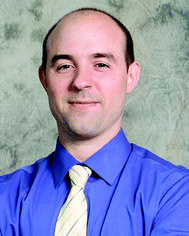Mission impossible to mission control
Aaron R.
Wheeler
*a and
Amy E.
Herr
*b
aDepartment of Chemistry, University of Toronto, 80 St. George St., Toronto, ON M5S 3H6, Canada. E-mail: aaron.wheeler@utoronto.ca; Fax: +1 (416) 946 3865; Tel: +1 (416) 946 386
bBioengineering, University of California, Berkeley, 308B Stanley Hall, MC # 1762, Berkeley, CA 94720-1762, USA. E-mail: aeh@berkeley.edu
 Aaron R. Wheeler | Aaron Wheeler completed his PhD in Chemistry in 2003, working with Dick Zare at Stanford University. He then spent two years as an NIH postdoctoral fellow at UCLA, and since 2005, he has been the Canada Research Chair of Bioanalytical Chemistry at the University of Toronto. Wheeler's research interests range broadly from clinical analysis to cell-based assays to proteomics, with a central theme of developing microfluidic tools to solve laboratory problems. Wheeler is fortunate to work with a creative, prolific research group, whose success has led to international recognition including the Joseph Black award from the Royal Society of Chemistry. |
 Amy E. Herr | Amy E. Herr earned a Ph.D. degree from Stanford University in Mechanical Engineering as a US National Science Foundation Graduate Research Fellow, advised by Profs. Thomas Kenny and Juan Santiago. From 2002-07, Amy was a technical staff member at Sandia National Laboratories. She is now an Associate Professor of Bioengineering at the University of California, Berkeley. Amy has served on several international conferences program committees including Gordon Research Conferences and MicroTAS. Recent honors include recognitions by NSF (CAREER), NIH (New Innovator), the Alfred P. Sloan Foundation, Eli Lilly & Co., and DARPA (Young Faculty Award), as well as being named the Outstanding Instructor by undergraduates in her department. Her research interests center on advancing quantitation in life sciences and clinical problems, particularly through the study and application of electrokinetic phenomena in multi-stage microsystems. http://herrlab.berkeley.edu |
This newest cohort of Emerging Investigators is, in a word, a group of “control freaks”: controlling fluids, controlling forces, controlling fields. We see these investigators using fine fluid control to introduce gas-in-oil-in-water droplet formation (Chen et al., 10.1039/c2lc40437k), production of liquid metal microspheres (Ward et al., 10.1039/c2lc40492c), and generation of nanoliter droplet libraries (Garstecki et al., 10.1039/c2lc40540g). We see these investigators use force control to enable label-free tumor cell separation and enrichment in spiral microchannels (Sun et al., 10.1039/c2lc40679a), directly addressable femtoliter droplet arrays (Iino et al., 10.1039/c2lc40394c) and simple RNA purification in a rotary microsystem (Seo et al., 10.1039/c2lc40487g). We see these researchers use control of fields to yield novel approaches including screening of photosynthesis in algae (Basu et al., 10.1039/c2lc40478h), integrated electrofluidic circuits (Wu et al., 10.1039/c2lc40436b), and water purification using photoelectrocatalysis (Wang et al., 10.1039/c2lc40428a). With impact ranging from laboratory bench top analysis, to low resource clinical measurements, to critical environmental and energy challenges, these are but a few of the studies you will find in the present issue.
Taking a cue from the high level of interest in Lab on a Chip's 2010 Emerging InvestigatorsThemed Issue, the Royal Society of Chemistry (RSC), publisher of Lab on a Chip, organized this second special issue devoted to the work of early career researchers. An ardent supporter and promoter of work of early career researchers, the RSC continues to foster development of the next generation of global thought leaders, through recognition of technical excellence at conferences (including μTAS, the GRC, and other important forums), the Pioneers of Miniaturisation Lectureship (http://www.rsc.org/Publishing/Journals/lc/pioneers-miniaturisation-prize.asp), the “Chips and Tips” web feature (http://www.rsc.org/Publishing/Journals/lc/Chips_and_Tips/index.asp), a YouTube (http://www.youtube.com/user/labonachipvideos) and FlikR presence, and a highly active and deeply engaged editorial staff. We are proud to be a part of this effort, in helping to assemble the Emerging Investigators contributors and drawing attention to the amazing work being undertaken by these early career researchers and their teams.
Certainly, evolving interests are chronicled through the last twelve years of Lab on a Chip. If this Emerging Investigators issue is a mark of things to come, we look forward to more truly new functionality made possible by accessing length, force, and time scales available with fine control of microfluidics. Things that would, just a few years ago have been considered “mission impossible” using macroscale tools now becomes possible through miniaturization and, as evidenced by the present assembled work, control.
Special thanks to Dr Mais Jebrail for putting together the cover art for this issue.
| This journal is © The Royal Society of Chemistry 2012 |
